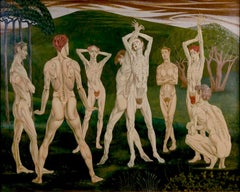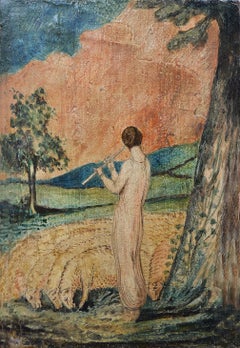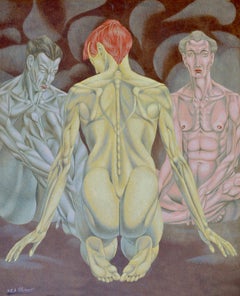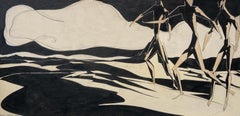Want more images or videos?
Request additional images or videos from the seller
1 of 5
Francis PlummerThe Rest, Egg Tempera, 20th Century English Painting
$4,135.83List Price
About the Item
- Creator:Francis Plummer (1930 - 2019)
- Dimensions:Height: 19 in (48.26 cm)Width: 15 in (38.1 cm)
- More Editions & Sizes:1 of 1Price: $4,136
- Medium:
- Movement & Style:
- Period:
- Condition:
- Gallery Location:London, GB
- Reference Number:1stDibs: LU52412626872
About the Seller
5.0
Vetted Professional Seller
Every seller passes strict standards for authenticity and reliability
Established in 2007
1stDibs seller since 2014
82 sales on 1stDibs
Typical response time: 4 hours
Authenticity Guarantee
In the unlikely event there’s an issue with an item’s authenticity, contact us within 1 year for a full refund. DetailsMoney-Back Guarantee
If your item is not as described, is damaged in transit, or does not arrive, contact us within 7 days for a full refund. Details24-Hour Cancellation
You have a 24-hour grace period in which to reconsider your purchase, with no questions asked.Vetted Professional Sellers
Our world-class sellers must adhere to strict standards for service and quality, maintaining the integrity of our listings.Price-Match Guarantee
If you find that a seller listed the same item for a lower price elsewhere, we’ll match it.Trusted Global Delivery
Our best-in-class carrier network provides specialized shipping options worldwide, including custom delivery.You May Also Like
Myth III - British 1936 Modern art tempera painting Ida Graves poet family
By Blair Hughes-Stanton
Located in Hagley, England
This superb British 1930's modern art tempera painting is by noted interwar artist Blair Hughes-Stanton. Painted in 1936 it is part of the myth se...
Category
1930s Modern Figurative Paintings
Materials
Egg Tempera
Blair Hughes-StantonMyth III - British 1936 Modern art tempera painting Ida Graves poet family, 1936
$19,852 Sale Price
20% Off
H 32 in W 40 in D 1 in
UN Poster Design American Scene Mid 20th Century Modernism WPA World Peace
By Jo Cain
Located in New York, NY
UN Poster Design American Scene Mid 20th Century Modernism WPA World Peace
Jo Cain (1904 – 2003)
We Are All Members of the Human Race: UN Poster Proposal
21 x...
Category
1940s American Modern Figurative Paintings
Materials
Egg Tempera, Board
$29,500
H 30 in W 25 in D 2 in
Parade
By Catherine Koenig
Located in Buffalo, NY
An original egg tempera painting by American female artist Catherine Koenig.
Category
1950s Modern Figurative Paintings
Materials
Board, Egg Tempera
Fort of Khotyn
Located in Edinburgh, GB
Born on May 9, 1942, in the city of Chernivtsi. Graduated from the Moscow Higher Art and Industrial School (1972). Teachers in the specialty: A. Sklyarenko, I. Bogdashevsky, G. Vinog...
Category
1970s Modern Figurative Paintings
Materials
Egg Tempera
Siamese Cat with Kittens by Orovida Pissarro - Egg tempura painting
By Orovida Pissarro
Located in London, GB
Siamese Cat with Kittens by Orovida Pissarro (1893-1968)
Egg tempera on linen
39 x 48 cm (15³/₈ x 18⁷/₈ inches)
Signed lower right Orovida and dated lower left 1934
Provenance
J Ankri, 8th October 1967
Literature
K L Erickson, Orovida Pissarro: Painter and Print-Maker with A Catalogue Raisonné of Paintings, (doctoral thesis), Oxford, 1992, Appendices, no. 51, p. 56 (illustrated)
Exhibition
London, The Leicester Galleries, Paintings by Orovida, February 1935, no. 6
Women’s International Art Club, 20th February - 13th March 1937, no. 273
London, Redfern Gallery, Ten Years of Work by Orovida, 5th-28th May 1938, no. 7
London, The Royal Society of British Artists, Summer Exhibition, 1947, no. 281 (possibly the etching)
London, O’Hana Gallery, Paintings, Drawings and Coloured Etchings: Orovida, 3rd-18th October 1957, no. 13
Artist biography
Orovida Camille Pissarro, Lucien and Esther Pissarro’s only child, was the first woman in the Pissarro family as well as the first of her generation to become an artist. Born in Epping, England in 1893, she lived and worked predominantly in London where she became a prominent member of several British arts clubs and societies.
She first learned to paint in the Impressionist style of her father, but after a brief period of formal study with Walter Sickert in 1913 she renounced formal art schooling. Throughout her career, Orovida always remained outside of any mainstream British art movements. Much to Lucien's disappointment she soon turned away from naturalistic painting and developed her own unusual style combining elements of Japanese, Chinese, Persian and Indian art. Her rejection of Impressionism, which for the Pissarro family had become a way of life, together with the simultaneous decision to drop her famous last name and simply use Orovida as a ‘nom de peintre’, reflected a deep desire for independence and distance from the weight of the family legacy.
Orovida's most distinctive and notable works were produced from the period of 1919 to 1939 using her own homemade egg tempera applied in thin, delicate washes to silk, linen or paper and sometimes embellished with brocade borders. These elegant and richly decorative works generally depict Eastern, Asian and African subjects, such as Mongolian horse...
Category
1930s Modern Animal Paintings
Materials
Linen, Egg Tempera
$24,815
H 15.36 in W 18.9 in
Tending the Garden
By Robert Elton Tindall
Located in Missouri, MO
Robert Elton Tindall (1913-1983)
"Tending the Garden" (Girl with a Hoe) c. 1940
Egg Tempera with Resin Oil Glazes on Panel
Signed Lower Left
Site: 10 x 9 inches
Framed: 15 x 14 inch...
Category
Mid-20th Century American Modern Figurative Paintings
Materials
Egg Tempera, Wood Panel
Mural Study for "History of Water" American Scene Modernism Social Realism WPA
By Thomas Hart Benton
Located in New York, NY
Mural Study for "History of Water" American Scene Modernism Social Realism WPA
Thomas Hart Benton (American, 1889-1975)
"Water Story" (Study for The History of Water)
Tempera and o...
Category
1930s American Modern Figurative Paintings
Materials
Oil, Egg Tempera, Board
Price Upon Request
H 28 in W 24 in
WPA Mural Study American Scene Social Realism Mid 20th Century Modern Workers
By Seymour Fogel
Located in New York, NY
WPA Mural Study American Scene Social Realism Mid 20th Century Modern Workers
Seymour Fogel (1911-1984)
Mural Study, untitled
11 x 49 1/4 inches (sight)
Tempera on board
Provenance:...
Category
1930s American Modern Figurative Paintings
Materials
Egg Tempera, Board
Mural Study 1933 Depression Era Mid-Century WPA Modern American Scene Drawing
By Michael Loew
Located in New York, NY
Mural Study 1933 Depression Era Mid-Century WPA Modern American Scene Drawing.
Study to Scale Mural Sketch for “Evolution of Textile Production” East. All,...
Category
1930s American Modern Figurative Paintings
Materials
Egg Tempera, Board
$7,500
H 16 in W 21 in D 2 in
Byzantine Icon "Virgin of the Sign" (Orans) with Child Emmanuel & Cherubim
Located in Segovia, ES
Virgin of the Sign (Orans), with the Christ Child Emmanuel and Cherubim
Artist: Oliver Samsinger
Technique: Egg tempera on gesso and wood, with 24-karat gold leaf application.
Dimens...
Category
2010s Byzantine Portrait Paintings
Materials
Gold Leaf
$1,806
H 14.97 in W 16.93 in D 1.3 in
More From This Seller
View AllThe Prelude, Early 20th Century Egg Tempera on board
By Francis Plummer
Located in London, GB
Francis Plummer
1930 - 2019
The Prelude
Egg Tempera on board
Image size: 39 ½ x 49 ¼ inches
Original Frame
This work comes from a rare collection of w...
Category
Early 20th Century Figurative Paintings
Materials
Egg Tempera
The Shepherd, English Victorian 19th Century Egg Tempera
Located in London, GB
Sir William Blake Richmond KCB, RA, PPRBSA
1842 - 1921
The Shepherd
Egg tempera on wooden panel, signed with initials bottom left
Image size: 8 ¼ x 5 ½ inches
Period gilt oak frame
A newly discovered work by the artist.
Sir William Blake Richmond KCB, RA, PPRBSA was an English portrait painter, sculptor and a designer of stained glass and mosaic. He is best known for his portrait work and decorative mosaics in St Paul's Cathedral in London.
He was the son of the portraitist George Richmond RA and studied at the Royal Academy Schools in the early 1860s. Influenced by his father and by Sir John Everett Millais, he is best known for his mosaic decorations below the dome and in the apse of St Paul's Cathedral in London.
His father, George Richmond, was one of 'the Ancients' who were a group of artists who formed around the visionary artist and poet William Blake. Samuel Palmer was an other of the ancients and a close friend of the family.
Our painting could have been inspired by George Richmond’s engraving 'The Shepherd', 1827, but in our panel the shepherd is turned round facing away, and is playing a flute instead of resting on a staff. But the sheep and other elements are there.
It is also suggestive of Welby Sherman's engraving after Samuel Palmer of the same name and date, but here the shepherd is sitting but like ours turned away. William Blake's is an altogether happier image given the figure is playing to his sheep.
Our painting is playing with some of the same ideas and feels like the same sort of period, and the ‘fresco’ like chalk ground is interesting, as is the pen and ink finishing on the tempera. All three are strongly influenced by Blake's illustrations to Thornton's 'Virgil'. The shepherd and his flock are clearly based on Thenot and his sheep in the Frontispiece to Thornton.
Blake Richmond wrote:"If there be the least value in my pictures, it is due to such lovely early impressions derived from the sweet poetic work of many of my father's contemporaries, Calvert, Blake and others, whose shadows are substance still to me" [Sir William Blake Richmond, letter to his father, 50 years after the death of William Blake, from Stirling op. cit p. 28].
Richmond was given private art lessons by John Ruskin before attending the Royal Academy for three years. After that he spent a number of years in Italy, where an encounter with a shepherd called Beppino, 'a splendid speciman of a Sabine Shepherd', could also have gave him the inspiration for the painting we show here. Richmond recalls how he met Beppino on the hillside, and was invited to share the shade of the shepherd's capanna, a wooden hut. 'What a place! In an instant of time I was back into the age of kings, and I knew Romulus had lived and am sure that he lived in a hut exactly like this one'.
That night Richmond dined at Beppino's hut 'on roast kid, hard bread dipped in Roman wine, goat's cream and white ricotta'. The shepherd had such an impression on Richmond that he sought him out on a return visit to Italy some years later, but was saddened to hear that Beppino 'had joined his fore-fathers in the shades'.
He was moved to write the following, which perfectly expresses the mood of this painting and his tribute to a fleeting companion:
'Little events of this kind unite past times with present, create and emphasis continuity of human instincts, which seem to defy time and make travel so intensely interesting and invigorating to a citizen of this world. One need not go to the palace, far otherwise, or to cities and towns to discover the kernal of enduring civilisations. One finds it, if one wills to do so, in the backbone of the world, an ancient peasantry who have watched and still watch the progress of the stars'.
Richmond was influential in the early stages of the Arts and Crafts Movement in his selection of bold colours and materials for the mosaics in St. Paul's Cathedral and in his collaboration with James Powell and Sons...
Category
1860s Victorian Figurative Paintings
Materials
Ink, Egg Tempera
The Triple Deity, 20th Century Egg Tempera
By Francis Plummer
Located in London, GB
Francis Plummer
1930 - 2019
The Triple Deity
Egg Tempera on board, signed lower left
Image size: 24 x 20 inches
Gilt Framed
Plummer specialised in th...
Category
1950s Art Deco Figurative Paintings
Materials
Egg Tempera
Forgotten Journey, 20th Century British Artist, Signed and Dated 1939
By Harold Yates
Located in London, GB
Watercolour and ink on paper, signed and dated '1939' bottom left and entitled on the reverse
Image size: 18 x 9 inches (45.75 x 23 cm)
Original frame
This is a wonderfully moving w...
Category
1930s Modern Figurative Paintings
Materials
Ink, Watercolor
A Cafe in Madrid, Oil on Board Painting, Signed and Dated 1950, English Artist
By Clifford Hall
Located in London, GB
Oil on board, signed and dated '50 bottom right, entitled on reverse
Image size: 13 1/2 x 9 1/2 inches (34.5 x 23 cm)
Original frame
Exhibitions
1989, Belgrave Gallery, 22 Mason's Yard, Duke Street, St. James', London SW1 'Clifford Hall (1904-1973) 15th June - 14th July, no.12.
Clifford Hall
Clifford Hall was born in Wandsworth in 1904, and spent his youth in nearby Richmond upon Thames...
Category
Mid-20th Century Modern Figurative Paintings
Materials
Oil, Board
The String Puppet, 20th Century Oil Painting
By Alice Headley Neave
Located in London, GB
Oil on canvas, signed bottom left
Image size: 30 x 25 inches (76.25 x 63.5 cm)
Alice Headley Neave was the daughter of Dr Arthur Henry Headley Huc...
Category
20th Century Modern Figurative Paintings
Materials
Canvas, Oil
Recently Viewed
View AllMore Ways To Browse
Medusa Art
Oil Painting 1800
Skaters Painting
Ivan Albright
Jean Gabriel Domergue
Oil Painting Girl With Dog
St John The Baptist
1960s Figurative Oil Paintings
Der Blaue Reiter
Frans Hals
Petite Paintings
Wrestling Art
Clyde Steadman
Paintings Of Vintage Dresses
William S Schwartz
Cake Painting
Concert Paintings
Cream Oil Painting



